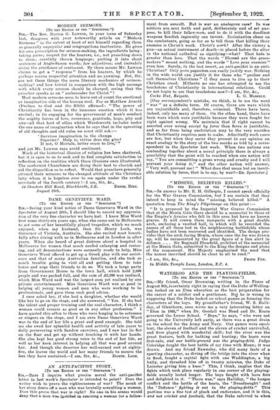AN ANTI-PACIFIST STORY.
[To THE EDITOR or THE " SPECTATOR.") gm—Pare I inquire what precise moral the anti-pacifist letter in last week's Spectator is intended to point? Does the writer wish to prove the righteousness of war? The monk of her story drove off a man who was brutally assaulting a woman. Does this prove that war is right? No one in his senses would deny that a man was jnatified in rescuing a woman (or a fellow-
man) from assault. But is mar an analogous case? In war soldiers are sent forth and paid, deliberately and of set pur- pose, to kill their fellow-men, and to do it with the deadliest weapons fiendish ingenuity can invent. Ecclesiastics cheer on the combatants, going so far as to tell them that killing their enemies is Christ's work. Christ's work/ After the victory a gun—an actual instrument of death—is placed before the altar in the national cathedral as signifying—what? That hate is greater than love. That the words "Blessed are the peace- makers" meant nothing, and the words " Love your enemies " even less. Surely, in the last resort, an anti-pacifist is an anti- Christian? Only pure paganism can really justify war. Nothing in the wide world can justify it for those who " profess and call themselves Christians " if they mean to live up to their Christian creed. Hitherto no one has attempted to use the touchstone of Christianity in international relations. Could we not begin to use that touchstone now?—I am, Sir, &c., [Our correspondent's mistake, we think, is to use the word " war " as a definite term. Of course, there are wars which are unjustifiable and, therefore, criminal. There have been; indeed, only too many of them. On the other hand, there have been wars which were justifiable because they were fought for right against wrong. We maintain that if right cannot be asserted over wrong except by force then force is justifiable, and so far from being unchristian may be the very sacrifice that Christianity requires men to make. Admittedly such cases are few, but when they occur they present in our opinion an exact analogy to the story of the two monks as told by a corre- spondent in the Spectator last week. When two nations are contending together about a moral principle there is always a possibility that the point will be reached when one nation will say, " You are committing a gross wrong and cruelty and I will prevent your doing it," and the other nation will answer, " Very well, prevent me! " What does that mean but an inevit- able solution by force, that is to say, by war?—En. Spectator.]


































 Previous page
Previous page